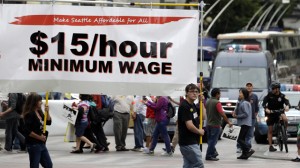
Demonstrators protesting what they say are low wages and improper treatment for fast-food workers march in downtown Seattle. (AP Photo/Elaine Thompson, File)
America’s unrivaled inequality will be center stage in our political discourse this year, as lawmakers debate raising the minimum wage, extending unemployment benefits for the long-term jobless and the Affordable Care Act’s Medicaid expansion leading up to November’s elections.
But in one sense, these debates are more about partisan politics and the interests of the major parties’ constituencies than ideology.
There is, at least in theory, broad agreement across the political spectrum that it is both proper and necessary for the government to intervene in the economy to correct market failures –- assuring that the private sector functions as it is supposed to is the “free market” thing to do. And one would be hard pressed to identify a more destructive market failure than that which keeps one in three Americans –- including tens of millions of full-time workers –- living at or below the poverty line.
According to economic theory, a free market transaction is one between two parties who both have perfect information about the state of the market – what others are paying for the same goods. Operating on a level playing field, free from explicit or implicit coercion, they each pursue their own interests, and in the end agree to a price that’s no higher than what the market will bear.
That comes pretty close to describing salary negotiations between employers and highly skilled professionals, or unions representing large numbers of lower-wage workers. It bears little resemblance to a “negotiation” between an individual who needs a low-wage job to survive and a huge company with teams of human resources experts and labor consultants.
As a result, taxpayers indirectly subsidize the profits of low-wage employers. Studies have found that workers at a single Wal-Mart receive as much as $900,000 in Medicaid, food stamps and other assistance, and that low-wage workers in the fast-food industry alone claim $7 billion per year in public benefits. It’s remarkable that anyone who claims fealty to the free market would argue that this doesn’t represent a market failure.
There are two obvious ways that the government could move to repair the failure in our market for low-wage labor. The first would be to remove the barriers to unionization that have gradually been put in place since the middle of the last century. According to recent surveys, 44 percent of non-union workers and 90 percent of union workers want to be represented by a union, but only around 11 percent of American workers — and just seven percent of the private sector workforce — is organized today.
Or we can raise the minimum wage so that people who work full-time are guaranteed a livable wage without having to rely on the social safety net. Doing so would benefit not only those toiling at minimum wage jobs – as Benjamin Harris and Melissa Kearney of the Brooking Foundation point out, a minimum wage hike would have a “ripple effect” on the entire lower-end of the labor market, increasing the incomes of about one third of the American workforce.
(It would also increase consumer demand — people with lower incomes tend to spend any extra cash they get rather than banking it — creating a salutary circle of job creation and deficit reduction.)
Opponents of minimum wage hikes argue that they’re “job killers.” Aside from the fact that the evidence doesn’t support this claim – economist John Schmitt reviewed decades of empirical research on this question last year and concluded that raising the minimum has “no discernible effect on employment” –- it’s also inconsistent with free market theory. According to Econ 101 texts, if a firm can’t turn a profit paying market prices for what it requires to produce its products – whether that’s cement for construction or labor for flipping burgers –- it should go out of business and be replaced by another firm with greater efficiency. This lies at the heart of what’s known as “creative destruction” — the process of building new enterprises on the ruins of older, less efficient ones — which is supposed to benefit the entire economy at the end of the day.
As a share of the overall economy, corporate profits are at an all-time high while wages — which have declined by seven percent over the past seven years after adjusting for inflation –- are at an all-time low. This is a sign of a broken labor market, and raising the minimum wage would go a long way toward fixing it.


